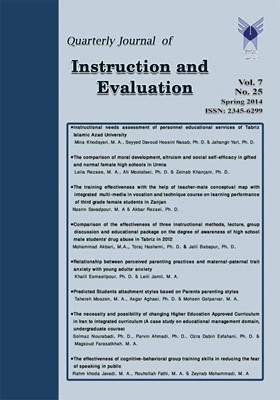The effectiveness of cognitive-behavioral group training skills in reducing the fear of speaking in public
Subject Areas : Educational Psychologyrahmkhoda javadi 1 , Rouhollah Fathi 2 , Zeynab Mohammadi 3
1 - kharazmi univ
2 - کارشناسی ارشد مشاوره، دانشگاه خوارزمی، تهران، ایران.
3 - کارشناسی ارشد ژنتیک و اصلاح نژاد، دانشگاه کشاورزی و منابع طبیعی رامین، اهواز، ایران.
Keywords: Students, Cognitive-Behavioral Skills, group training, fear of speak in public,
Abstract :
The present study aimed examining the effectiveness of cognitive behavioral group training skills on reducing the fear of speaking in public. The research method was quasi-experimental with pretest. Post-test and control group. The subjects participated in clinical interview based on statistical diagnostic mental disorders (4th version) by a clinical psychologist and implementing pauls self-reporting scale (1996) Concerning self-confidence as a lecturer and Andller’s lecture anxiety of stimulus-response inventory, using purposive sampling method 28 people among B. A. students from Islamic Azad university in Mahdasht were selected as sample size. They were randomly divided into two groups (control and experiment). After 12 sessions training course the post-test was run. The data were analysed through one-way analysis of variance. The results indicated that there was a significant different between the effectiveness of these training on reducing speaking in public anxiety increasing self-Confidence. Thus, it can be concluded in public anxiety in public, cognitive - behavioral group training skills can used.
اصلانی، جلیل، ساعد، امید، احمدی، علی(1389)، اثربخشی حساسیت زدایی با حرکات چشم و بازپردازش (EMDR) بر کاهش ترس از صحبت کردن در جمع، روانشناسی معاصر، دوره پنجم، ویژهنامه زمستان 1389.
توزنده جانی، حسن، نعیمی، هدا، احمدپور،محبوبه(1390)، تأثیرمهارتهای مقابلهای شناختی- رفتاری در اضطراب و سازگاری کودکان مبتلا به لکنت زبان، مجله پژوهش در علوم توانبخشی، دوره 7، شماره2
داداشزاده، حسین، یزداندوست، رخساره، غرایی، بنفشه، اصغرنژاد فرید، علیاصغر (1391)، اثربخشی درمان شناختی – رفتاری گروهی و مواجهه درمانی بر میزان سوگیری تعبیر و ترس از ارزیابی منفی در اختلال اضطراب اجتماعی، مجله روانپزشکی و روانشناسی بالینی ایران، سال هجدهم، شماره 1، بهار 1391، 51-40.
دانش، عصمت (1376)، بررسی علل و پیامدهای اضطراب سخنرانی در دانشجویان دانشگاه و تأثیر روش خودآموزش دهی بر کاهش آن، رساله دکتری منتشر نشده، دانشگاه تربیت مدرس، دانشکده علوم انسانی.
مسعود نیا، ابراهیم (1387)، خودکارآمدی عمومی و فوبی اجتماعی: ارزیابی مدل شناختی- اجتماعی بندورا، فصلنامه مطالعات روانشناختی، شماره 15
عطری فرد، مهدیه، شعیری، محمدرضا، رسولزاده طباطیایی، جان بزرگی، مسعود، آزادفلاح، پرویز، بانوپور، ابوالفضل(1391)، بررسی اثربخشی درمان شناختی- رفتاری مبتنی بر الگوی هافمن در کاهش نشانههای اختلال اضطراب اجتماعی، فصلنامه فرهنگ مشاوره و روان درمانی، شماره 9، بهار 1391، صفحه53-23.
وکیلیان، سارا، علی قنبری هاشم آبادی، بهرام، طباطبایی، سید محمود(1387)، بررسی تأثیر افزودن آموزش مهارتهای اجتماعی برگروه درمانی شناختی رفتاری در درمان هراس اجتماعی دانشجویان، مجله علمی پژوهشی اصول بهداشت روانی، 87- تابستان 1387، سال دهم، شماره 2 (پیاپی 38)، صفحه 97.
Anderson, L., Zimand, E., Hodges, L.S., Rothbaum, B.O. (2005). Cognitive Behavioral Therapy for Public- Speaking Anxiety using virtual reality for Exposure. Journal of Depression and anxicty.
Andrew C. Batler, Jason E. Chapman, Evan M. Forman, Aron T.Beck (2006). The empirical status of cognitive – behavioral therapy: A review of meta-analyses.Clinical Psychology Review, 26:17-31, 42: 826-34
Antony, M. (1997), Assessment and treatment of social phobia. Journal of Clinical Psychiatry .
Bandura, A. (1977). Self-efficacy: Toward a unifying theory of behavioral change. Psychological Review, 84, 191–215. doi:10.1037/0033-295X.84.2.19.
Bandura, A., Caprara, G. V., Barbaranelli, C., Gerbino, M., & Pastorelli,(2003). Role of affective self-regulatory efficacy in diverse spheres psychosocial functioning. Child Development, 74, 769 –782. doi: 10.1111/1467-8624.00567.
Bandura, A., & Cervone, D. (1986). Differential engagement of self reactive influences in cognitive motivation. Organizational Behavior and Human Decision Processes, 38, 92–113. doi: 10.1016/0749- 5978(86)90028-2.
De Jong, A& Broake, T. E. (2009). EMDR and anxiety disorders: Exploring The Current status. Journal of EMDR practice and research: (3) 33-143.
Heimberg RG, (2000). Current status of psychotherapeutic interventions for social phobia. Journal of Clinical Psychiatry, 62:36-42.
Heimberg RG, Becker RE, (2002), Cognitive behavioral group therapy for social phobia. Basic mechanisms and clinical strategies. New York: Guilford; 200-30.
Hope DA, Heimberg RG, Juster H, Turk CL (2000). Managing social anxiety: A cognitive behavioral therapy approach. Sanantonio, TX: Psychological corporation; 50-70.
Mannuzza, S, Schneide,. FR, Chapman, TF, Liebowit2, MR., Klein, DF., Fyer, AJ (1995). Generalized social phobia: reliability and validity. Arch Gen Psychology, 223-337.
Phillip R.Goldin, Michal Ziv, Hooria Jazaieri, Kelly Werner, Helena Kramer, Richard G.Heimberg, James J. Gross. (2012). Cognitive reappraisal self-efficacy mediates the effects of individual cognitive- behavioral therapy for social anxiety disorder. Journal of counsulting and clinical psychology. Vol 80. No: 6, 1034-1040
Richard W.Seim, Stacey A. Waller and C. Richard spates(2010), A Preliminary investigation of continuous and intermittent Exposures in the treatment of public speaking Anxiety, Journal of Clinical Psychiatry.
Scott, Richard. M. (2000). The use of EMRD in treating a public speaking for anxiety for individuals of high, moderate and low absorption ability.
Turk, C. L., Heimberg, R. G., & Hope, D. A. (2001). Social anxiety disorder. In: H. D. Barlow (Ed.). Clinica handbook of psychological disorder: A step-by-step treatment (3rd.ed.). New York: Guilford Press.
Witt, Poull, Brown, Kennaria, Robberts, James.B, Weasel, Jessica, Sawyer, Chris R& Behake, Ralph.R (2006). Somatic anxiety attends before, during and ofter giving a public speech. The Sowthern communication Journal, 71, 87, 100.

